Zhexu Wang
Kimi K2.5: Visual Agentic Intelligence
Feb 02, 2026Abstract:We introduce Kimi K2.5, an open-source multimodal agentic model designed to advance general agentic intelligence. K2.5 emphasizes the joint optimization of text and vision so that two modalities enhance each other. This includes a series of techniques such as joint text-vision pre-training, zero-vision SFT, and joint text-vision reinforcement learning. Building on this multimodal foundation, K2.5 introduces Agent Swarm, a self-directed parallel agent orchestration framework that dynamically decomposes complex tasks into heterogeneous sub-problems and executes them concurrently. Extensive evaluations show that Kimi K2.5 achieves state-of-the-art results across various domains including coding, vision, reasoning, and agentic tasks. Agent Swarm also reduces latency by up to $4.5\times$ over single-agent baselines. We release the post-trained Kimi K2.5 model checkpoint to facilitate future research and real-world applications of agentic intelligence.
Kimi K2: Open Agentic Intelligence
Jul 28, 2025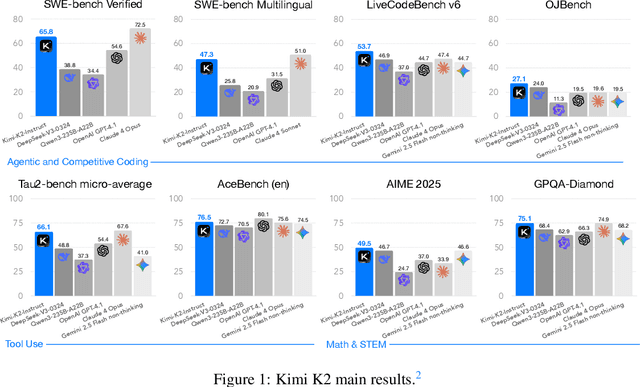


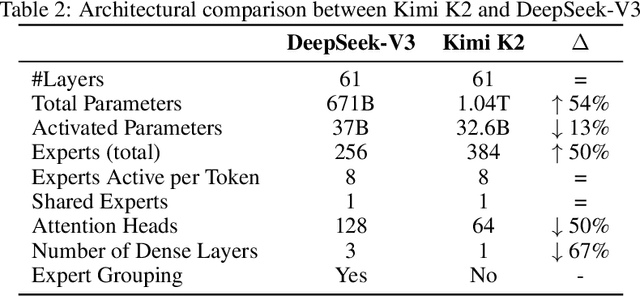
Abstract:We introduce Kimi K2, a Mixture-of-Experts (MoE) large language model with 32 billion activated parameters and 1 trillion total parameters. We propose the MuonClip optimizer, which improves upon Muon with a novel QK-clip technique to address training instability while enjoying the advanced token efficiency of Muon. Based on MuonClip, K2 was pre-trained on 15.5 trillion tokens with zero loss spike. During post-training, K2 undergoes a multi-stage post-training process, highlighted by a large-scale agentic data synthesis pipeline and a joint reinforcement learning (RL) stage, where the model improves its capabilities through interactions with real and synthetic environments. Kimi K2 achieves state-of-the-art performance among open-source non-thinking models, with strengths in agentic capabilities. Notably, K2 obtains 66.1 on Tau2-Bench, 76.5 on ACEBench (En), 65.8 on SWE-Bench Verified, and 47.3 on SWE-Bench Multilingual -- surpassing most open and closed-sourced baselines in non-thinking settings. It also exhibits strong capabilities in coding, mathematics, and reasoning tasks, with a score of 53.7 on LiveCodeBench v6, 49.5 on AIME 2025, 75.1 on GPQA-Diamond, and 27.1 on OJBench, all without extended thinking. These results position Kimi K2 as one of the most capable open-source large language models to date, particularly in software engineering and agentic tasks. We release our base and post-trained model checkpoints to facilitate future research and applications of agentic intelligence.
DriveRX: A Vision-Language Reasoning Model for Cross-Task Autonomous Driving
May 27, 2025Abstract:Autonomous driving requires real-time, robust reasoning across perception, prediction, planning, and behavior. However, conventional end-to-end models fail to generalize in complex scenarios due to the lack of structured reasoning. Recent vision-language models (VLMs) have been applied to driving tasks, but they typically rely on isolated modules and static supervision, limiting their ability to support multi-stage decision-making. We present AutoDriveRL, a unified training framework that formulates autonomous driving as a structured reasoning process over four core tasks. Each task is independently modeled as a vision-language question-answering problem and optimized using task-specific reward models, enabling fine-grained reinforcement signals at different reasoning stages. Within this framework, we train DriveRX, a cross-task reasoning VLM designed for real-time decision-making. DriveRX achieves strong performance on a public benchmark, outperforming GPT-4o in behavior reasoning and demonstrating robustness under complex or corrupted driving conditions. Our analysis further highlights the impact of vision encoder design and reward-guided reasoning compression. We will release the AutoDriveRL framework and the DriveRX model to support future research.
CodeCriticBench: A Holistic Code Critique Benchmark for Large Language Models
Feb 23, 2025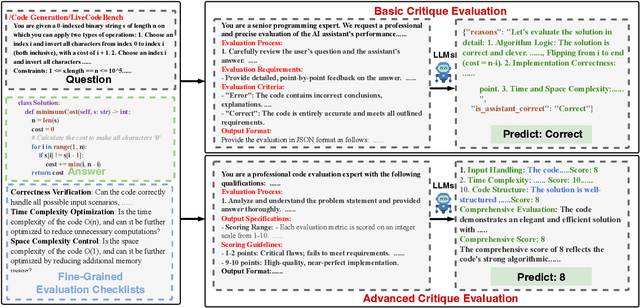
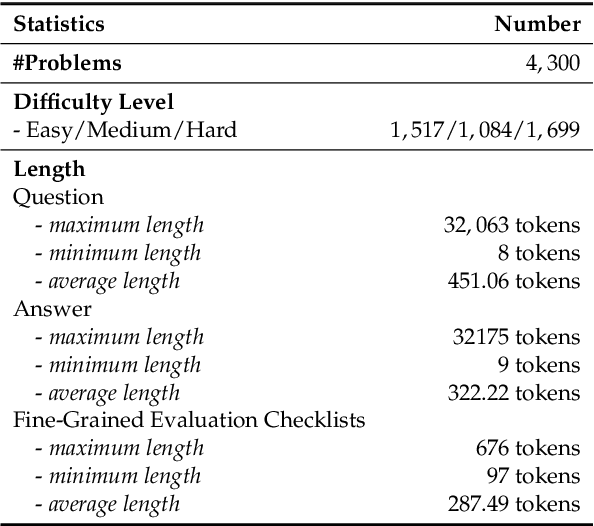

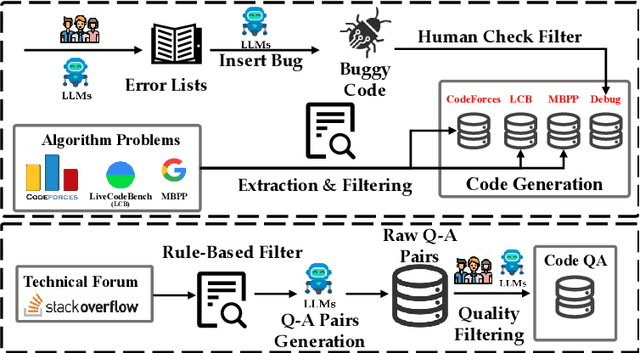
Abstract:The critique capacity of Large Language Models (LLMs) is essential for reasoning abilities, which can provide necessary suggestions (e.g., detailed analysis and constructive feedback). Therefore, how to evaluate the critique capacity of LLMs has drawn great attention and several critique benchmarks have been proposed. However, existing critique benchmarks usually have the following limitations: (1). Focusing on diverse reasoning tasks in general domains and insufficient evaluation on code tasks (e.g., only covering code generation task), where the difficulty of queries is relatively easy (e.g., the code queries of CriticBench are from Humaneval and MBPP). (2). Lacking comprehensive evaluation from different dimensions. To address these limitations, we introduce a holistic code critique benchmark for LLMs called CodeCriticBench. Specifically, our CodeCriticBench includes two mainstream code tasks (i.e., code generation and code QA) with different difficulties. Besides, the evaluation protocols include basic critique evaluation and advanced critique evaluation for different characteristics, where fine-grained evaluation checklists are well-designed for advanced settings. Finally, we conduct extensive experimental results of existing LLMs, which show the effectiveness of CodeCriticBench.
How Do Your Code LLMs Perform? Empowering Code Instruction Tuning with High-Quality Data
Sep 05, 2024



Abstract:Recently, there has been a growing interest in studying how to construct better code instruction tuning data. However, we observe Code models trained with these datasets exhibit high performance on HumanEval but perform worse on other benchmarks such as LiveCodeBench. Upon further investigation, we find that many datasets suffer from severe data leakage. After cleaning up most of the leaked data, some well-known high-quality datasets perform poorly. This discovery reveals a new challenge: identifying which dataset genuinely qualify as high-quality code instruction data. To address this, we propose an efficient code data pruning strategy for selecting good samples. Our approach is based on three dimensions: instruction complexity, response quality, and instruction diversity. Based on our selected data, we present XCoder, a family of models finetuned from LLaMA3. Our experiments show XCoder achieves new state-of-the-art performance using fewer training data, which verify the effectiveness of our data strategy. Moreover, we perform a comprehensive analysis on the data composition and find existing code datasets have different characteristics according to their construction methods, which provide new insights for future code LLMs. Our models and dataset are released in https://github.com/banksy23/XCoder
CS-Bench: A Comprehensive Benchmark for Large Language Models towards Computer Science Mastery
Jun 12, 2024



Abstract:Computer Science (CS) stands as a testament to the intricacies of human intelligence, profoundly advancing the development of artificial intelligence and modern society. However, the current community of large language models (LLMs) overly focuses on benchmarks for analyzing specific foundational skills (e.g. mathematics and code generation), neglecting an all-round evaluation of the computer science field. To bridge this gap, we introduce CS-Bench, the first bilingual (Chinese-English) benchmark dedicated to evaluating the performance of LLMs in computer science. CS-Bench comprises approximately 5K meticulously curated test samples, covering 26 subfields across 4 key areas of computer science, encompassing various task forms and divisions of knowledge and reasoning. Utilizing CS-Bench, we conduct a comprehensive evaluation of over 30 mainstream LLMs, revealing the relationship between CS performance and model scales. We also quantitatively analyze the reasons for failures in existing LLMs and highlight directions for improvements, including knowledge supplementation and CS-specific reasoning. Further cross-capability experiments show a high correlation between LLMs' capabilities in computer science and their abilities in mathematics and coding. Moreover, expert LLMs specialized in mathematics and coding also demonstrate strong performances in several CS subfields. Looking ahead, we envision CS-Bench serving as a cornerstone for LLM applications in the CS field and paving new avenues in assessing LLMs' diverse reasoning capabilities. The CS-Bench data and evaluation code are available at https://github.com/csbench/csbench.
 Add to Chrome
Add to Chrome Add to Firefox
Add to Firefox Add to Edge
Add to Edge